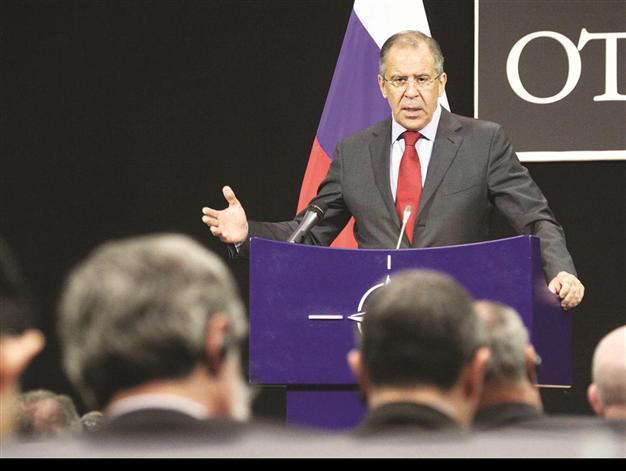NATO, Russia fall apart on Afghanistan, shield
BRUSSELS

Russian Foreign Minister Sergei Lavrov talks during a meeting of the NATO-Russia Council at NATO headquarters in Brussels. AP Photo
The
NATO allies and
Russia remain deeply at odds over both plans to withdraw NATO forces from Afghanistan in 2014 and the alliance’s U.S.-led missile shield in Europe.
Despite rifts on several fronts, the two sides have teamed up to fight terrorism and piracy, and cooperate on Afghanistan, after talks in Brussels between Russian Foreign Minister Sergei
Lavrov and NATO representatives.
“It is well known that we do not agree on all issues, but it is also clear that we are committed to continue discussing all issues at all times,” NATO Secretary-General Anders Fogh Rasmussen said. But the former Cold War foes have failed to reach a compromise on NATO’s plan to withdraw its forces from Afghanistan by 2014.
Lavrov sharply criticized NATO’s plan, saying that coalition troops should remain in the country until Afghan government forces are capable of ensuring security. “As long as Afghanistan is not able to ensure by itself the security in the country, the artificial timelines for withdrawal are not correct and they should not be set,” Lavrov said. NATO plans to hand over lead responsibility for the war against the Taliban to the Afghan army and police by the middle of next year, and to withdraw its troops by the end of 2014.
‘Clear guarantees needed’Rasmussen responded to Lavrov’s criticism, saying the withdrawal schedule had been agreed on with the government in Kabul, and that it was “definitely not artificial.” Lavrov and NATO ministers also discussed a plan to give the alliance a new logistics facility on Russian territory to transfer military cargo to and from Afghanistan. The proposal, now being considered by Russian lawmakers, would for the first time, allow alliance members to set up a logistics facility for troops and cargo in Ulyanovsk, Russia.
Officials said there were “no differences” between the two sides on the use of the air base in Ulyanovsk. “Our missile defense system is not designed to threaten Russia or undermine the strategic position of Russia,” Rasmussen said. Russia has demanded legally-binding guarantees that the missile shield will not undermine its arsenal, but NATO refuses to enter into such an agreement and has instead offered political reassurances.
“We need clear guarantees that it is not targeted against us,” Lavrov told a news conference.
